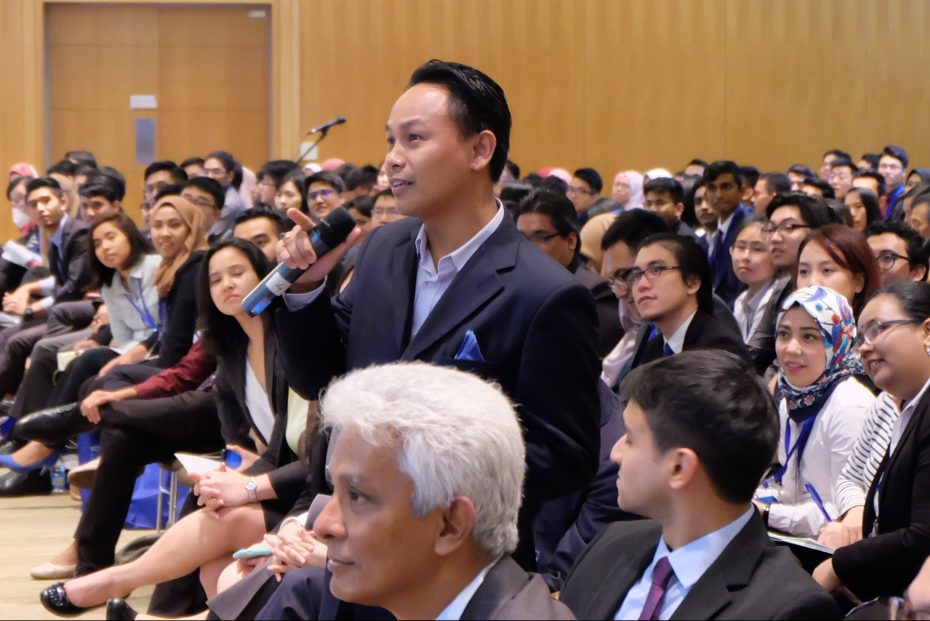IN 2009, Uber launched a ride-sharing app that shook up the taxi industry, and forever changed the way people hail rides.
In 2017, a similar shakeup in the existing financial status quo is in the pipeline, as an exciting new economic frontier, built for native netizens, jostles its way in.
It’s called financial technology, or fintech for short.
This is great news for millennials, because it means greater opportunities to make their mark in digital startups, scaleups – the evolved version of startups – and small and medium-sized enterprises (SMEs).
From making financial services more accessible digitally to increasing the ease of handling business transactions, fintech helps facilitate the growth of the Internet economy, said Datuk Seri Idris Jala, chief executive officer of the government’s Performance Management and Delivery Unit (PEMANDU).
Idris was speaking at the inaugural Youth Economic Forum (YEF), organised by the Perdana Fellows Alumni Association earlier this month.
The event brought together current and future leaders in the Malaysian economy, and the main objective was to get young Malaysians interested in economic policy.
“Build a micro economy that works for yourself. No one’s stopping you from innovating,” said Idris, who also encouraged young Malaysians to learn from Internet entrepreneurs like Alibaba Group founder Jack Ma.
“Take advantage of the digital advancement that’s available to you. It’s all about the digital trade now.”
Fintech toolkit
Among the tools available through fintech are peer-to-peer (P2P) lending and equity crowdfunding (ECF).
“P2P lending and ECF are new digital business models addressing the gaps in your seed capital to start your business,” said Chin Wei Min, head of Securities Commission Malaysia’s (SC) Innovation and Digital Strategies Department.
P2P lending is essentially an online service that matches lenders with borrowers. Since it’s all done online, P2P companies’ overhead costs are lower, leading to cheaper rates.
According to the SC, this market-based financing helps build small businesses, which can then spur the economy onwards.
Six P2P operators have already been granted lending licenses by the SC and are expected to start operations in 2017 – B2B FinPAL, Peoplender, Ethis Kapital, ManagePay Services, Modalku Ventures and FundedByMe Malaysia – making them the first authorised platforms in the Asean region.
ECF, on the other hand, is essentially an equity Kickstarter. It’s a mechanism that allows a crowd of investors to fund startup enterprises, in return for a stake in the company, also known as equity.
Chin said this business model, spearheaded by local sites like Crowdo, Eureeca, Equity.PitchIN and Crowdplus.Asia, benefits young entrepreneurs as it helps cut out banks as intermediaries and eases the funding process.
“There are many fresh graduates who are looking to finance their business ideas and this will be the way to do it,” Chin added.

The youth present were enthusiastic about the new, tech-driven methods available to shake up the economy.
International relations and policitcs student Emilhisham Shamzul, 20, who heard about ECF at the Youth Economic Forum, is excited about the prospects of these new funding options for young entrepreneurs.
“This would definitely be my choice if I were to start a business. It involves the public and encourages them to get involved in helping one another’s innovative ideas,” he said.
“Banks can be a hassle because of their bureaucracy. It takes a longer time for them to approve the capital for our businesses, compared to these platforms.”
Fintech and youth seem to go hand-in-hand, but finance analyst David Lim, 25, said it won’t take off without the buy-in from young Malaysians.
“As long as there is a lack of awareness and trust in the system, these methods of financing won’t gain traction,” he said.
With this in mind, financial institutions like Bank Negara and the SC are both taking steps to ensure fintech takes off.
As P2P lending and ECF are considered risky, for now at least, Bank Negara Malaysia has come up with a framework for a fintech regulatory “sandbox”, a safe space where businesses can test innovative products, services, business models, and delivery mechanisms.
This works both ways – to attract ideas from startups, as well as improve risk management.
SC has also launched a regulatory framework for P2P lending, making Malaysia one of the first countries in Asia to do so.
Under these regulations, individuals are not allowed to raise money through P2P platforms. It is meant to fund projects and businesses, which would have safeguards in place.
For example, P2P platform operators have to disclose information on issuers (aka the investors) and the risk assessment and credit scoring parameters adopted by the operator.
A brave new world
Thanks to innovation and technology, fintech is challenging the banking system worldwide, meaning sometimes banks are completely cut out of the equation.
Homegrown startup MoneyMatch, a platform modelled after UK-based P2P money transfer service TransferWise, allows users to transfer money across borders and exchange currencies at lower costs than traditional banks.
TransferWise currently moves about US$10bil (RM44bil) through its platform, a clear indicator of the potential of fintech and services like MoneyMatch.
And that’s why the Perdana Fellows decided to organise YEF – to show young people how exciting and relevant economic policy and trends can be to them.
Ngo Lee Ling, 28, a Perdana Fellow currently working with Education Minister Datuk Seri Mahdzir Khalid, feels that young entrepreneurs need alternative methods instead of relying on government funding or allocations for businesses.
“Banks have more collateral. We don’t want to rely so much on the old financing schemes with higher interest rates. On top of that, the economy is slowing down and banks aren’t lending much money,” said Ngo.
“Through fintech, I hope to see more successful startups like Uber and Grab, but in other economic sectors,” she added.
That’s already happening.
Soft Space, a local mobile payment technology company that turns smartphones into mobile point of sale (MPOS) devices for debit or credit card payments, works with Maybank and CIMB.
It’s a great example of how a fresh, young company has bridged the gap between banks and young users. From struggling to get banks to invest in their mobile payments idea, Soft Space recorded RM1bil worth of transactions in Malaysia in early 2015 alone.
It’s clear both the economy and the financial markets are changing rapidly, especially now since technology has come into play.
All it needs now is for young Malaysians to take advantage of this new financial democratisation and reach for their dreams.
“The disruption caused by the digital economy gives youths a chance to engage in businesses across infinite borders,” said Lim.
“Right now, youths are limited only by their imagination and willingness to take risks.”




